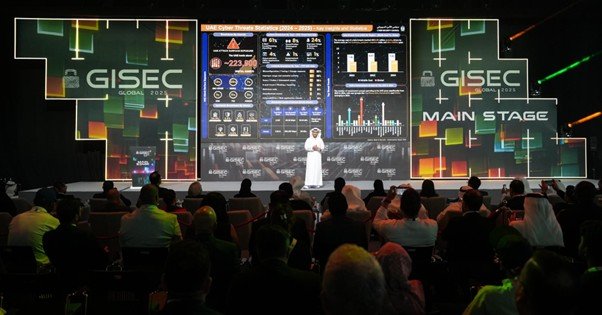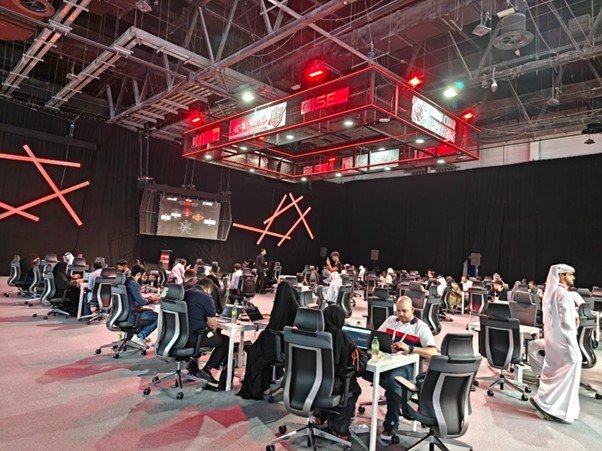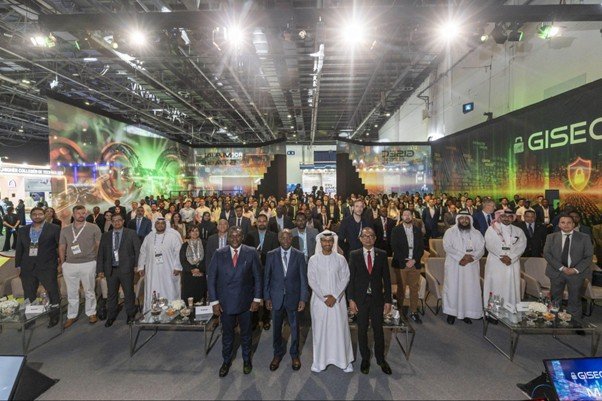Dubai, UAE – On May 6, 2025, GISEC Global 2025 launched with a powerful start at the Dubai World Trade Centre, setting the stage for a transformative exploration of cybersecurity’s future. Day one brought together industry pioneers, government officials, ethical hackers, and innovative startups to confront the escalating challenges of AI-driven cyber threats, critical infrastructure vulnerabilities, and open-source intelligence (OSINT). With live hacking demos, high-level policy discussions, and a thrilling pitch competition, the event underscored Dubai’s role as a global cybersecurity hub.
A Dynamic Opening to a Global Cybersecurity Summit
GISEC Global 2025 opened with a vibrant showcase of expertise and innovation, drawing thousands of attendees to the Dubai World Trade Centre. The day’s agenda was packed with sessions across multiple stages, including the Main Stage, Dark Stage, Xlabs Stage, Critical Infrastructure Stage, and OSINT Lens. From live demonstrations of hacking techniques to strategic talks on national cybersecurity, the event delivered actionable insights for professionals, policymakers, and entrepreneurs alike.

Key Highlights of Day One
- Live Hacking Showcases: Ethical hackers like Jayson E. Street and Minh Hieu Ngo stunned audiences with real-world attack simulations, revealing vulnerabilities in banks and mobile apps.
- AI-Powered Cybersecurity: Experts like Daniel Ishaka and Saikat Asaduzzaman explored AI’s dual role as a defensive tool and a weapon for cybercriminals.
- Critical Infrastructure Focus: Panels addressed securing smart cities and industrial systems, with insights from leaders like John Ballentine and Gaius HJ Lee.
- GISEC North Star Pitch Competition: Over 40 startups, including Mobile Hacking Lab and Arnica, pitched groundbreaking solutions to a panel of top investors and CISOs.
- Global Cyber Drill: High-level discussions, led by H.E. Dr. Mohamed Al Kuwaiti, emphasized cross-border collaboration and national cyber resilience.
Main Stage: Setting the Global Cybersecurity Agenda
The Main Stage in Hall 4 kicked off with a compelling lineup of global leaders. H.E. Dr. Mohamed Al Kuwaiti, Head of Cybersecurity for the UAE Government, delivered a special address on “Building Resilient Smart Cities,” highlighting Dubai’s strategies for balancing innovation and security. His remarks, backed by the UAE’s $2 billion cybersecurity investment, reinforced the nation’s leadership in digital transformation.
A headline session, “Behind a Large-Scale Breach,” featured Joe Sullivan, former Security Chief at Uber and META, sharing hard-earned lessons from high-stakes cyberattacks. Moderated by broadcast journalist Laura Buckwell, the session captivated attendees with its candid exploration of corporate accountability. Eugene Kaspersky, CEO of Kaspersky, followed with a forward-looking talk on “What’s Next in AI-Driven Future Security,” addressing both the promise and perils of AI.

The day’s high-level ministerial session, “Overcoming Cybersecurity Challenges to Enhance the Digital Economy in Developing Countries,” brought together ministers from the Maldives, Ghana, and the UAE, alongside Dr. Cosmas Luckyson Zavazava from the ITU. The panel outlined strategies to strengthen digital economies while mitigating cyber risks, setting a collaborative tone for the event.
Dark Stage: Hacking Unveiled
Hall 7’s Dark Stage offered a thrilling dive into the hacker’s world. Jayson E. Street, a renowned ethical hacker who once (legally) robbed banks across five continents, presented “The Imposter Guides to Hacking!” Using everyday items with a clever twist, Street demonstrated how enterprises can be compromised, before unpacking the true essence of ethical hacking.
Mishaal Khan, known as the “Hacker CISO,” teamed up with Javier Leiva for “True Story – The Stalker Next Door,” a chilling OSINT investigation that traced harassing messages to the victim’s own IP address. Minh Hieu Ngo, a reformed fraudster, delivered a fast-paced demo, “The Shortcut .TXT File Trap,” showing how a phishing attack can steal sensitive data in under 60 seconds. These sessions left audiences both alarmed and inspired to bolster their defenses.
Xlabs Stage: AI and Innovation Take Center Stage
The Xlabs Stage in Hall 6 spotlighted AI’s transformative role in cybersecurity. Daniel Ishaka from Insight Technology Solutions presented “Harnessing AI for Cybersecurity Resilience,” showcasing how Microsoft security solutions enhance threat detection. Christa Abdul Karim from BPS Middle East followed with “Copilot in Control,” offering practical tips for small businesses to adopt AI securely.
Aimee Asmar from Security Matterz challenged the status quo in “From Compliance to Resilience,” advocating for dynamic cybersecurity frameworks. Tal Fialkow from Dream captivated attendees with “Cyber AI: Teaching Old Networks New Tricks,” demonstrating how legacy systems can be modernized to counter advanced threats.
Critical Infrastructure Stage: Safeguarding Society’s Backbone
Hall 2’s Critical Infrastructure Stage tackled vulnerabilities in essential sectors. A panel on “Resilient, Data-Driven Urban Infrastructure,” moderated by Alexandra Topalian, featured John Ballentine from the Port Authority of New York and New Jersey and Lt. Colonel Dr. Hamad Al Nuaimi from Abu Dhabi Police. They discussed securing IoT-driven smart cities while building public trust.
Gaius HJ Lee, CISO of Jeju Air, addressed “Modern Aviation Threats,” focusing on protecting aircraft IP networks and digital air traffic control. Stephen Driggers from TxOne Networks highlighted AI and edge computing’s impact on oil and gas, citing Shell’s predictive maintenance as a success story.
OSINT Lens: Unlocking Open-Source Intelligence
The OSINT Program in Hall 2 underscored the power of open-source intelligence. Mishaal Khan’s “The Evolution, Applications, and Future Potential of OSINT” explored its role in law enforcement and cybersecurity. Danni Brooke, a former UK covert police officer, led a live case study, “Inside the Investigation,” demonstrating how digital footprints can expose malicious networks.
Manit Sahib from the Global Fund (UN) presented “OSINT: True Story. Recon to Ransomware,” detailing a real-world breach fueled by AI and public data. Bertrand Milot from Bradley & Rollins offered a Middle East-focused talk, “Under the Hood of Cybercrime,” complete with a live deepfake detection demo.

Workshops: Empowering Professionals
GISEC Academy in Hall 3 hosted hands-on workshops for skill-building. Saikat Asaduzzaman’s “Hacking with AI” explored AI’s offensive capabilities, from automated phishing to password cracking, alongside defensive strategies. Daniel Ehrenreich’s “Introduction Workshop on Industrial Risks and Cyber Defense” covered ICS/SCADA vulnerabilities and best practices.
Tarek Naja’s “Azure Identities Battleground” allowed participants to think like APT groups, breaching Azure AD in live demos. Mohammed Ruwaid Zumla’s “OT Attack-Tree Modelling” taught proactive risk mapping for operational technology, equipping attendees to strengthen OT defenses.
GISEC North Star Pitch Competition: Startups Shine
The GISEC North Star Program in Hall 1 launched its pitch competition, featuring over 40 cybersecurity startups. Innovators like Umit Aksu of Mobile Hacking Lab, Nir Veltman of Arnica, and Gustavo Pinto of Eva Cybersec pitched to a jury including Ayoub Fathi from Noon and Celia Mantshiyane from First National Bank. The semifinals showcased solutions tackling mobile security, ransomware, and AI-driven threats.
A panel, “Unicorn Hunting: The Secret Formula for Spotting Billion-Dollar Startups,” featured Fadi Ghandour and Dr. Chenxi Wang, revealing what investors seek in game-changing ventures. The competition’s energy underscored the vibrant future of cybersecurity innovation.
Global Cyber Drill: Strengthening National Resilience
The HackO Sphere Pavilion’s Global Cyber Drill focused on government-led cybersecurity. Dr. Radheya AlHashmi from the UAE Prime Minister’s Office delivered a keynote on the Government Accelerators Program. Dialogue sessions on transformative education, digital frontiers, and quantum computing featured Rachel Btaiche and Alya Al-Saadi from INTERPOL.
A fireside chat on cross-border digital transformation, led by Yasmine Idrissi Azzouzi from the ITU, explored lessons for cyber resilience. Groups presented findings on accelerating ambitions, reinforcing the need for global collaboration.
A Bold Start to GISEC 2025
Day one of GISEC Global 2025 set a high bar, blending real-world insights with visionary strategies. From live hacks to ministerial panels, the event highlighted the urgency of addressing AI-driven threats and securing critical infrastructure. As startups pitched bold ideas and experts shared battle-tested solutions, attendees left inspired to shape a safer digital future.
With two more days of innovation ahead, GISEC 2025 is poised to cement Dubai’s status as a global cybersecurity leader. Stay tuned for more groundbreaking moments at the Dubai World Trade Centre.


